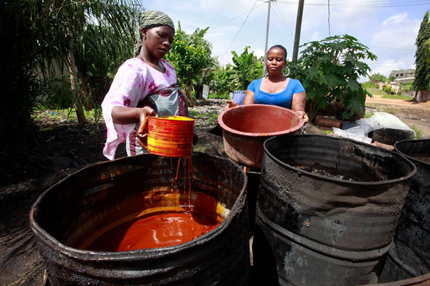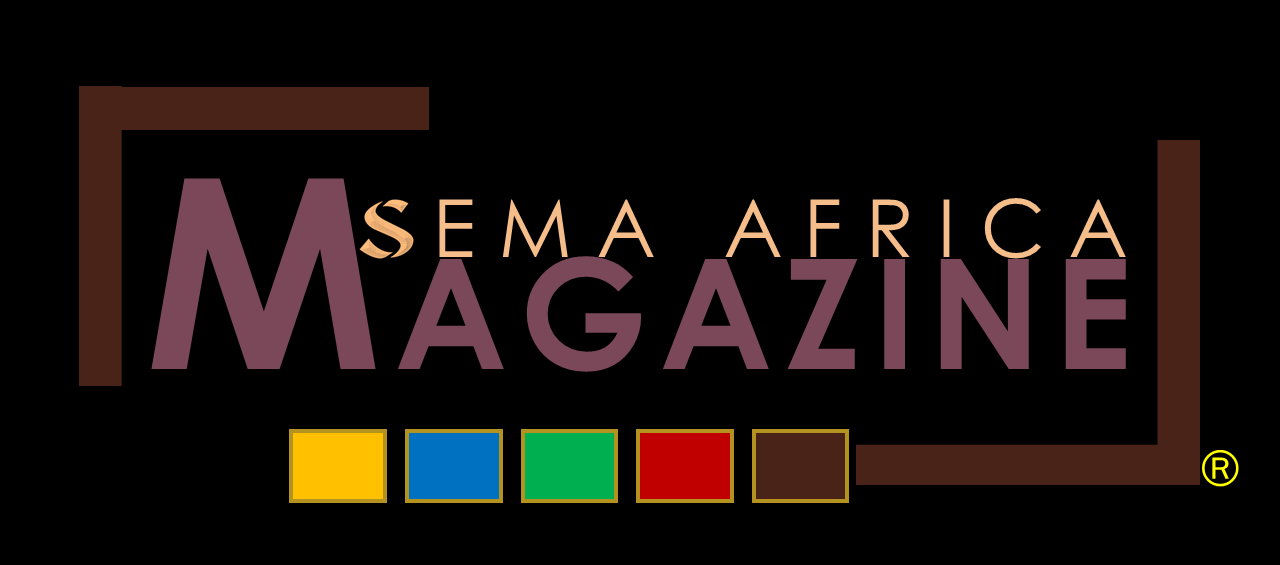As oil palm expands, African nations agree
to protect
forests

Women prepare to extract red palm oil in Dabou, around 49 km (30 miles) from Abidjan June 12, 2013. Ivory Coast is seeking to double palm oil production to around 600,000 tonnes by 2020. REUTERS/Thierry Gouegnon
Aim is to avoid replicating the tropical forest losses across Southeast Asia as a result of palm oil expansion
Central and West African countries have promised to protect their tropical forests from being cut down to make way for palm oil crops, in a declaration signed on Wednesday by governments representing more than 70 percent of Africa's tropical forests.
Palm oil, one of the world's most widely used vegetable oils, is a fast-growing business and a major cause of tropical deforestation worldwide.
The seven countries that signed the declaration in Marrakesh, where international climate talks are taking place, want to expand into the $50 billion global palm oil market.
The countries, however, also are home to about 13 percent of the world's remaining tropical forest, particularly in the Congo Basin region.
Those are at risk as the palm oil market expands, toward an estimated $88 billion a year by 2022, according to the World Economic Forum.
"It's really exciting and important that these countries which are about to expand into the market have learned from the path that (Malaysia and Indonesia) took," Dominic Waughray, head of public-private partnerships at the World Economic Forum, said in a telephone interview.
Indonesia and Malaysia export about 85 percent of the world's palm oil. Malaysia has already cleared much of its forests to grow the crop, and Indonesia is in the process of doing so, Waughray told the Thomson Reuters Foundation.
Women's rights and gender equality, we highlights issues affecting women, girls and transgender people.

The World Economic Forum hosts the Tropical Forest Alliance 2020, a partnership of governments, companies and non-governmental organisations, which produced the Marrakesh Declaration.
About half of global tropical deforestation is driven by beef, soy, palm, and paper and pulp. But palm oil is probably the biggest driver of the four commodities, Waughray said.
It is used in a host of everyday goods, from soap to breakfast cereals, as well as for frying and fuel.
West African women defend traditional palm oil
In the
last century, industrial oil palm plantations expanded around the
world, first in Asia, then in Latin America. The development of
high-yielding oil palms and new processing techniques—which
transformed the traditionally viscous red liquid into a colourless,
odourless oil suitable for global markets—made oil palm plantations
a lucrative investment. In recent years, the expansion has targeted
Africa with a vengeance. And numerous campaigns and advocacy
efforts have highlighted its negative impacts, including
deforestation, displacement of communities, deplorable working
conditions, the expansion of monocultures, the erosion of
biodiversity and climate change.
But there
is another side of the palm oil story—one that begins in West and
Central Africa, where peasants practice agroecology, harvest palm
fruit from small farms and wild groves and process it for local
consumption as they have for generations. Oil palm originates in
this part of the world, and was only introduced to Asia and Latin
America as a plantation crop in the twentieth century. In its
centre of origin, the crop remains a vital part of local culture,
livelihoods and cuisine, and its artisanal production is controlled
primarily by rural women.
This video
provides a window onto the reality of women-led artisanal palm oil
production, a reality often rendered invisible in narratives of
global industrial palm oil. This model is under threat by the rapid
advance of industrial plantations, free trade agreements and
corporate-controlled value chains at the expense of community-based
food systems.
PRESSURE FROM BUYERS
Some of the pressure on governments to protect forests comes from major buyers such as Kellogg's, Unilever, and Procter & Gamble, which aim to strip deforestation from their palm oil supply chains by 2020, Waughray said.
Paul Polman, chief executive officer of Unilever - a major palm oil buyer - welcomed the signing of the declaration.
"Palm oil, if produced sustainably, can play a key role in poverty alleviation by helping farmers thrive economically while adopting sustainable agricultural and business practices," he said on Wednesday.
Under the declaration, governments have also promised to protect the human rights and livelihoods of indigenous people and smallholder farmers, and help them access the booming market.
"Deforestation has often been linked to human rights violations," said Hindou Oumarou Ibrahim, co-chair of the International Indigenous People's Forum on Climate Change.
"People are losing access to the land they have always lived on and farmed. I hope this declaration will be an example to the rest of the region and encourage other tropical forest African countries to follow in the commitment," she said in a statement.
The seven governments are the Central African Republic, Ivory Coast, the Democratic Republic of Congo, Ghana, Liberia, the Republic of Congo and Sierra Leone.
The declaration "is not just about environmental sustainability, it's also transparency in that supply chain (including) respecting and managing the rights of indigenous peoples groups," Waughray said.
Thomson Reuters Foundation

YOUR SHOPPING MADE EASY
Africa's Change Makers Magazine
COMPANY
AFRICAN ACHIEVERS INTERNATIONAL Inc. is a global media and technology company including lifestyle media publisher SEMA AFRICA
online
Magazine AFRICAN ACHIEVERS MAGAZINE, digital shopping
platform PA-BEAUTY STATION.COM, event management
PRIDE OF AFRICA, awards program AfIA
AWARDS, youth and talent development, PILLARS OF
HOPE and AAK, Volunteerism
UNIVERSIDAY grassroots community support
NAD and financial support
REMITGROW and monthly subscription box AAi Must
Have. ....
More from African Achievers International
PLATFORM
About Sema
Africa
Our
Team
Contact
Us
Jobs
Internship
Upcoming Events
Get a Domain/Website
Mama Africa - My Story
Write for Sema Africa
Advertise
Promote your Events
Travel
Policies
Archive
SUBSCRIBE









